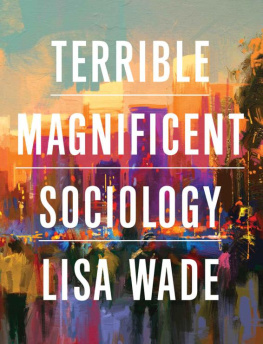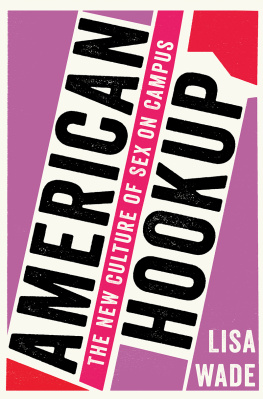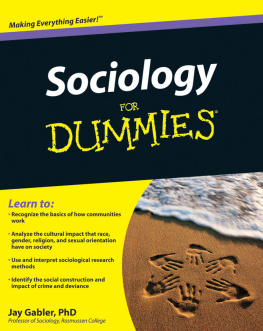Lisa Wade - Terrible Magnificent Sociology (First Edition)
Here you can read online Lisa Wade - Terrible Magnificent Sociology (First Edition) full text of the book (entire story) in english for free. Download pdf and epub, get meaning, cover and reviews about this ebook. year: 2021, publisher: W. W. Norton & Company, genre: Politics. Description of the work, (preface) as well as reviews are available. Best literature library LitArk.com created for fans of good reading and offers a wide selection of genres:
Romance novel
Science fiction
Adventure
Detective
Science
History
Home and family
Prose
Art
Politics
Computer
Non-fiction
Religion
Business
Children
Humor
Choose a favorite category and find really read worthwhile books. Enjoy immersion in the world of imagination, feel the emotions of the characters or learn something new for yourself, make an fascinating discovery.
Terrible Magnificent Sociology (First Edition): summary, description and annotation
We offer to read an annotation, description, summary or preface (depends on what the author of the book "Terrible Magnificent Sociology (First Edition)" wrote himself). If you haven't found the necessary information about the book — write in the comments, we will try to find it.
Lisa Wade: author's other books
Who wrote Terrible Magnificent Sociology (First Edition)? Find out the surname, the name of the author of the book and a list of all author's works by series.
Terrible Magnificent Sociology (First Edition) — read online for free the complete book (whole text) full work
Below is the text of the book, divided by pages. System saving the place of the last page read, allows you to conveniently read the book "Terrible Magnificent Sociology (First Edition)" online for free, without having to search again every time where you left off. Put a bookmark, and you can go to the page where you finished reading at any time.
Font size:
Interval:
Bookmark:
Please note that this version of the ebook does not include access to any media or print supplements that are sold packaged with the printed book.


W. W. NORTON & COMPANY has been independent since its founding in 1923, when William Warder Norton and Mary D. Herter Norton first published lectures delivered at the Peoples Institute, the adult education division of New York Citys Cooper Union. The firm soon expanded its program beyond the Institute, publishing books by celebrated academics from America and abroad. By midcentury, the two major pillars of Nortons publishing programtrade books and college textswere firmly established. In the 1950s, the Norton family transferred control of the company to its employees, and todaywith a staff of five hundred and hundreds of trade, college, and professional titles published each yearW. W. Norton & Company stands as the largest and oldest publishing house owned wholly by its employees.
Copyright 2022 by W. W. Norton & Company, Inc.
All rights reserved
First Edition
Editor: Sasha Levitt
Assistant Editor: Erika Nakagawa
Project Editor: Laura Dragonette
Managing Editor, College: Marian Johnson
Managing Editor, College Digital Media: Kim Yi
Associate Director of Production, College: Benjamin Reynolds
Media Editor: Eileen Connell
Associate Media Editor: Ariel Eaton
Media Editorial Assistant: Alexandra Park
Media Project Editor: Danielle Belfiore
Marketing Research and Strategy Director: Julia Hall
Design Director, College: Rubina Yeh
Text Design: Marisa Nakasone
Photo Editor: Catherine Abelman
Photo Researcher: Dena Digilio Betz
Director of College Permissions: Megan Schindel
Permissions Manager: Bethany Salminen
Text Permissions Specialist: Josh Garvin
Composition: Graphic World, Inc. / Sunil Kumar, Project Manager
Ebook Manager: Megan Crayne
Permission to use copyrighted material is included in the credits section of this book, which begins on .
ISBN: 978-0-393-26530-9 (paperback)
ISBN: 978-0-393-87689-5 (epub)
W. W. Norton & Company, Inc., 500 Fifth Avenue, New York, N.Y. 10110
www.wwnorton.com
W. W. Norton & Company Ltd., 15 Carlisle Street, London W1D 3BS
Ebook version: 1.1-retailer

LISA WADE, PHD, is an Associate Professor at Tulane University with appointments in Sociology, the Gender and Sexuality Studies Program, and the Newcomb Institute. An accomplished scholar, award-winning teacher, and public sociologist, she has become well known for delivering conversational yet compelling translations of sociological theory and research. Shes the author of American Hookup: The New Culture of Sex on Campus and, with Myra Marx Ferree, Gender: Ideas, Interactions, Institutions.
When I was a child, I did not live in so-called good school districts. I never took an AP class; if I was gifted, nobody in my high school much noticed. I took the SAT but didnt know I was supposed to study for it. Though I applied to a handful of colleges, I was only admitted to one. And when I arrived for move-in day, it was the first time Id ever set foot on a college campus. I never could have imagined that someday I would write a book like this.
Sociology has given me so much: a career, peers, even friends. It has given me a platform from which to contribute meaningfully to public debate. But more than anything, its given me purpose. Sociology helps us see the social forces that transcend the individual and, with that lens, it empowers us to try to make the world a better place. To teach sociology is to give people the tools they need to remake their societies. And while Ive had the opportunity to share sociology with many different kinds of people in myriad ways, this book is among the most incredible opportunities Ive ever been afforded.
First and foremost, I wanted the book to be a good read. I devoted myself to writing crisply and engagingly. I looked for rich examples and clear statistics. I steered into rather than away from emotions, knowing that sociology not only can, but should, inspire curiosity, awe, intrigue, and delight, as well as disappointment, frustration, and even righteous anger. There is no excuse for sociology to be anything but riveting.
I did my best to do justice to the diversity of voices that have contributed to sociological thought, both in the past and today. That meant not only being inclusive but placing this wide array of scholars shoulder to shoulder with those who have historically been lifted up as our founding fathers. To do this, I was determined to be inclusive far beyond the central sociological concerns with race, class, and gender, and their intersections. Without diminishing the importance of these axes of identity, this book is also attentive to sexual orientation, disability, age, body size, citizenship status, the rural/urban divide, and more. I teach expressly about the value of standpoint, while modeling what it means to take diversity of viewpoint seriously. I hope readers will see themselves reflected not just in what sociologists study but in who sociologists are.
My vision also included a somewhat different approach to the lay of the sociological land. I start with an innovative chapter on the self. Most readers have grown up with the tradition of American individualism, an ideology that sits uncomfortably alongside sociologys basic premise: that there are social forces that transcend individuals. I tackle this problem head-on. In , I show that the individual self is, paradoxically, itself a social fact. Prepped with this astounding idea, readers are better able to accept the role of social facts in shaping other features of daily life.
I also felt it was important to include a chapter that theorizes social organizations, institutions, and structures. These are challenging ideas that deserve careful explication, especially if readers are to fully comprehend the nature of social inequality. This book takes the time to fully introduce them. Likewise, I include a chapter on elite power. All too often we focus on the disadvantages that accrue to some but fail to shine a light on the advantages that accrue to othersand the work they do to preserve those advantages. Elites do not go unexamined here.
I introduce historical figures and sociological research methods throughout the text instead of at the beginning. I do not expect readers to care about the modes of data collection for findings they have not yet encountered and the history of a field they have not yet studied. So, these things are introduced when they become relevant to the books overall intellectual trajectory. Comprehensive discussions of both sociological history and research methods are also included as appendices.
Roughly speaking, the book is organized in such a way as to introduce core theoretical concepts, address the complex phenomena of social inequality, and explore the potential for social change. Instead of sending readers off with just a few inspiring words, each of the final three chapters is aimed at empowering people to become not just sociological thinkers but engaged and efficacious members of their communities, both large and small. The book ends optimistically, without downplaying the real challenges we face or laying all the responsibility for social change on the next generation.
Font size:
Interval:
Bookmark:
Similar books «Terrible Magnificent Sociology (First Edition)»
Look at similar books to Terrible Magnificent Sociology (First Edition). We have selected literature similar in name and meaning in the hope of providing readers with more options to find new, interesting, not yet read works.
Discussion, reviews of the book Terrible Magnificent Sociology (First Edition) and just readers' own opinions. Leave your comments, write what you think about the work, its meaning or the main characters. Specify what exactly you liked and what you didn't like, and why you think so.













